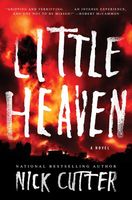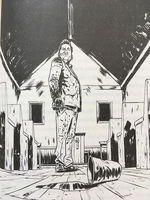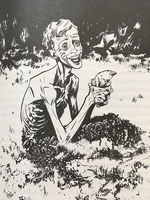A perfect day for noir horror!
By Lisa de Nikolits
It's the perfect day for a dash of horror! Noir horror, at that! we’re chatting with Nick Cutter, author of The Acolyte, The Deep, The Troop and most recently, Little Heaven. Nick, thank you for being with us! I really enjoyed Little Heaven and I feel it’s a sterling example of first-rate noir horror. I’d like to ask you a few questions about it, and about your writing in general.
Lisa: How would you characterise your relationship with the acclaimed literary author Craig Davidson? I know you guys are close but I’m wondering if he chirps at you while you write? Your writing is finely crafted literary prose, even when you’re describing the most unspeakably horrifying event and I’m wondering if that involves any collaboration with Craig? Or, like combative siblings, do you keep him at bay when you write?
Craig: Well, I used to joke about our relationship. Cutter was this tough, goth-y, rebel type guy and Craig was a Canlit stooge. But in truth, the relationship—which is not an actual relationship, because only one of us exists!—is symbiotic. I mean, in some ways there's a very thin cut between those two writing personas. In other ways I guess it can seem wider, and I'm not sure (weirdly) how much crossover there is between readers of Cutter and me. Some people like Davidson's stuff and think Cutter's a hack. Others think Cutter's the real deal and Davidson's a lame wet noodle. Some like both. Same hate both. It's weird. Writing’s weird. The life of a writer is weird!
Lisa: Parts of Little Heaven are really funny – for example, the discourse between the two hitmen about hair products and the relative dick sizes of men to equine and also, the relationship between the trio of mercenaries is quite hilarious in parts. Did you have fun writing this book?
Craig: I did! Again, tastes and opinions vary. I was going for a kind of neo-western vibe, which is going to work for some and not for others. But certainly, yes, I had a ball writing it. I've had a ball writing all the Cutter books . . . at least in the first draft stage. In the other stages you have to grapple with all the narrative and characters decisions you've made and try to right some of those wrongs, or decide if they really ARE wrongs—some readers will think so, but others would be dismayed if I axed them—so it's a constant negotiation with yourself, and your editor, as to what stays and what goes and the eventual tone of the book. It's a risk, but again that's the job.
Lisa: I’m a Catholic survivor, still bearing the scars of the hot branding irons of the Irish Sisters of Mercy and I am particularly fascinated by the religious horror noir that you portray so exquisitely:
“God’s face was that of an idiot. The moronic, drooling, palsied face of an enormous infant. A face covered in seeping boils and a-crawl with insects not to be found anywhere in nature. God’s eyes stared with malicious cruelty—there was vast power in that gaze, yes, although it was witlessly applied. That gaze took aim at anyone, disregarding goodness or worth. It ruined people chaotically, without wisdom or cause.”
I’d love you to share some insights with us on the development of this deeply malevolent imagery.
Craig: Well, readers of my stuff will see that I too have a particularly curdled view of religion. Organized religion, I guess, which seems at its worst to prey on the weakness or meekness or follower instinct knit to the character of our species. So I guess that was what that image means or says to me. And it's not very kind, and it's one-sided, and as I grow older I generally take a softer view on a lot of things, religion included. Whether that's a truly positive development I really couldn't tell you.
Lisa: In terms of noir imagery, this book was such a treat to read! “The mattress was thirty years old and probably saturated with a thousand dreary cumshots milked from the nutsacks of basset-faced johns by one dead-eyed whore or another.”
Your CanLit News
Subscribe to Open Book’s newsletter to get local book events, literary content, writing tips, and more in your inbox
That’s simply fantastic! Did that passage take a while to write/rewrite or did you nail in one go? How long did Little Heaven take to write, from idea to print?
Craig: Oh, I'd say a year or so. It flowed out of me, as Cutter books tend to. Good or ill, that's how they happen. I like to work every day when I can, 1000 or more words a day, so with that kind of output even a big book, as Little Heaven is, gets done pretty quick.
Lisa: Little Heaven mentions the following films and novels: The Monster from Green Hell (1957), The Brain from Planet Arous, (1957), The Premature Burial (1962), The Feasting Dead by John Metcalfe (1954), Heart of Darkness by Joseph Conrad (1899) and The House Made of Dawn by N. Scott Momaday (1968).
Would you say you find these kinds of movies and novels (and the timeframes in which they were made) inspiring? Are there any recent novels/movies that you feel have truly original themes and imagery?
Craig: I think those were used primarily to fit with the timeframe of the novel, it's early portions. To be honest, I haven't watched all of them! Though I've read both the books. Man, originality is such a tough thing. There are things that are original but maybe they don't quite work. I mean, I'm always respectful of writers who really try to give readers something completely unique and new and original, and it does happen and it does work, as it does with films. I thought Iain Reid's book, I’m Thinking of Ending Things, was really original. A risk. I think it worked. And I admire the fact he took it.
Lisa: Penultimate question! Are some of the scenes hard to write? Every scene, even the most horrific, goes into painstaking and patient detail – are these scenes tough to write? And, do you write them in later i.e., are they tk in your first draft with terrifying details to come down the line?
Craig: Some of those scenes were, yes, they were "turned up to 11" in the old Spinal Tap vernacular after the first draft. I had a sense of what I wanted to say, or the way I wanted to convey an image to the reader, but at first draft they were less fleshed (hah!) than they became in ensuing drafts. I just kept larding on the details!
Lisa: What’s next for Nick? Do we have a new book to look forward to in 2018?
Craig: I don't think I do! Unless I whip something up real fast. Craig’s got a short story collection due that year, probably, so I'll have something out that year I imagine.
Lisa: Thank you, Craig (and Nick!) for joining us today! And a shoutout to Adam Gorham, for his marvellous artwork inside.
https://www.inanna.ca/catalog/no-fury/
http://www.lisadenikolitswriter.com
https://49thshelf.com/Books/N/No-Fury-Like-That
https://49thshelf.com/Books/L/Little-Heaven5
The views expressed in the Writer-in-Residence blogs are those held by the authors and do not necessarily reflect the views of Open Book.
Originally from South Africa, Lisa de Nikolits has been a Canadian citizen since 2003. She has a Bachelor of Arts in English Literature and Philosophy and has lived in the U.S.A., Australia, and Britain. She is the author of seven acclaimed novels, including her most recent novel, No Fury Like That (Inanna Publications). She has won the IPPY Gold Medal for Women's Issues Fiction and was long-listed for the ReLit Award. Lisa has a short story in Postscripts To Darkness (2015), a short story in the anthology Thirteen O'Clock by the Mesdames of Mayhem, and flash fiction and a short story in the debut issue of Maud.Lin House.





